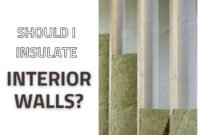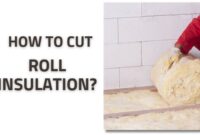Do you need to insulate your garage or not? The question is whether to endure the cold of an uninsulated garage or to fill all the cracks and crevices with types of insulation like fiberglass insulation or rigid foam, effectively sealing them off.
Here are the pros and cons of insulating garage.
When selecting whether or not to insulate your garage, there are several things to consider. How you use your garage is a crucial factor to consider. If you only park your car in the garage, the benefits might be limited.
However, if it’s used as a living space, insulation becomes more valuable. It could be worthwhile, though, if you want to utilize your garage as an addition to your home.

Pros VS Cons Of Insulating Garage
It’s beneficial to insulate your garage, especially if you need to heat and cool the space, whether you’re using a permanent heater or not. Proper insulation can reduce the energy needed to heat or cool your garage.
The Pros and cons of insulating are primarily useless if the heat doesn’t increase. The notion that insulation increases warmth is common.
Insulation works by reducing the rate at which heat moves through a barrier (like walls, ceilings, or floors), effectively minimizing air gaps and blocking cold air, which is beneficial in both hot and cold regions.
Pros
- Can Save on Energy Bills
Consider this. It’s chilly in your garage in the winter, whether you use it as a workshop or a place to work out, like the frigid conditions outdoors. To heat that space, your heater must operate for a long time after turning it on.
- Keeps The Garage a More Regular Temperature
Should a garage be insulated? Without insulation, your garage walls are now letting whatever heat you add out. However, insulation will keep that heat inside. As a result, your garage will remain warmer for longer. It is beneficial if you live in a cold region and spend a lot of time in your garage during the winter.
- Cuts Down on Moisture
Nobody likes to see their priceless Christmas decorations covered in mildew, but adding insulation will help you save the goods you have kept in your garage from harm.
Cons
- It Can be Expensive
Let’s start by discussing the price. The cost of insulating your garage varies. The average cost to protect your garage, according to howmuch.net, is between $1.48 and $1.95 per square foot. Insulation materials and installation fees vary.
- Can Take Years to Recoup Costs
Recoup the insulation price may take a while because insulating a garage can be costly. How often you utilize your garage will determine the number of things. You might not see a significant decrease in your energy cost if you don’t use your garage regularly.
- The Garage Door – So Many Issues
Garage door insulation is one of your garage’s most challenging insulating components. I mean, that’s huge. Just look at it. And each time you open it, you allow the outside air in and your climate-controlled air out. That air leak is enormous.
Should A Garage Be Insulated
If you’re debating the pros and cons of insulating a garage to improve your home—particularly when combined with air sealing and attic insulation—you can:
- Reduce your home’s energy use, especially in the summer and winter.
- Ensure the stability of your home’s structure
- Don’t let as much dampness enter your house.
- Improve the health of the air within your house
- All year round, make your house more comfortable.
- Reduce the likelihood that ice dams will harm your roof.
- Boost the effectiveness of your HVAC system (and keep it from getting overworked and worn out)
Additionally, upgrading your insulating garage walls is one of the energy-efficient home renovations that will provide a fantastic return on investment (ROI) when it comes time to sell your house.
Wrapping Up
When considering insulation for your garage, it’s important to understand the different types of insulation available. Fiberglass insulation is a common choice due to its affordability and ease of installation. Rigid foam is another option, known for its high energy efficiency and ability to create an air-tight seal.
The pros and cons of insulating garage will significantly improve your quality of life if heat is being radiated into your home from it in the summer or if the room over the garage is being made intolerably chilly in the winter.


